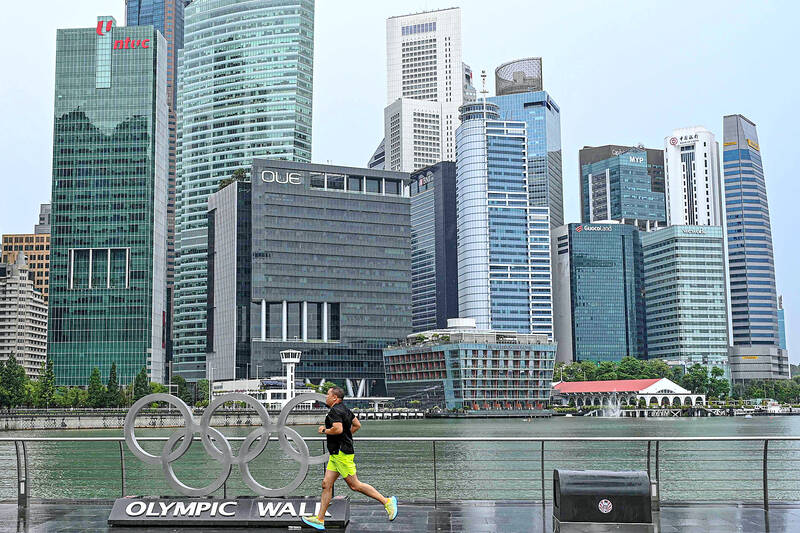Singapore’s economy grew more than expected in the third quarter, as a rush for all things linked to artificial intelligence (AI) drove up demand for computer chips, preliminary data released yesterday showed.
A healthy rebound in the key manufacturing sector powered the 4.1 percent year-on-year growth in the July-to-September period, the Singaporean Ministry of Trade and Industry said.
Economists had projected growth of less than 4 percent.

Photo: Roslan Rahman, AFP
Manufacturing, which includes computer chips, expanded 7.5 percent year-on-year, bouncing back from a 1.1 percent decline in the previous three months.
The government in August upgraded its economic growth forecast for this year from 1 to 3 percent to 2 to 3 percent.
Meanwhile, the Monetary Authority of Singapore said it would “maintain the prevailing rate of appreciation” of the Singaporean dollar, as the risks to inflation are “more balanced compared to three months ago.”
Singapore uses the exchange rate — the Singaporean dollar is pegged to a basket of currencies of its key trading partners — to deal with inflation, as it imports most of its needs.
“For the rest of 2024, Singapore’s growth should be sustained by the ongoing upswing in the electronics and trade cycles, as well as the easing in global financial conditions,” the central bank said.
Separately, Singapore yesterday moved to stop a S$2.2 billion (US$1.68 billion) deal that would have allowed German insurance giant Allianz SE to buy a majority stake in a local insurer.
Allianz in July announced a “pre-conditional voluntary cash general offer” to buy at least 51 percent of Singapore’s Income Insurance Ltd at S$40.58 per share as it seeks to strengthen its presence in Singapore and Asia.
Income Insurance had said it needed Allianz’s financial muscle to compete better in the industry.
The deal raised fears among some locals that being majority owned by a private company would dilute Income Insurance’s social mission of providing affordable insurance.
A former cooperative that became a non-listed company in 2022, Income Insurance’s largest shareholder is NTUC Enterprise Co-operative Ltd, a holding entity for the various social enterprises under the labor movement.
“The government has assessed the proposed transaction and has decided that it would not be in the public’s interest for the transaction, in its current form, to proceed,” Singaporean Minister of Culture, Community and Youth Edwin Tong (唐振輝) told parliament.
The ministry “is not satisfied that Income will be able to continue fulfilling its social mission after the proposed transaction,” he added.
A bill was tabled in parliament yesterday to allow the central bank to “withhold approval of the sale on grounds of public interest when it involves a current or former cooperative insurer,” Singaporean Prime Minister Lawrence Wong (黃循財) said on Facebook.

SEMICONDUCTORS: The German laser and plasma generator company will expand its local services as its specialized offerings support Taiwan’s semiconductor industries Trumpf SE + Co KG, a global leader in supplying laser technology and plasma generators used in chip production, is expanding its investments in Taiwan in an effort to deeply integrate into the global semiconductor supply chain in the pursuit of growth. The company, headquartered in Ditzingen, Germany, has invested significantly in a newly inaugurated regional technical center for plasma generators in Taoyuan, its latest expansion in Taiwan after being engaged in various industries for more than 25 years. The center, the first of its kind Trumpf built outside Germany, aims to serve customers from Taiwan, Japan, Southeast Asia and South Korea,

Gasoline and diesel prices at domestic fuel stations are to fall NT$0.2 per liter this week, down for a second consecutive week, CPC Corp, Taiwan (台灣中油) and Formosa Petrochemical Corp (台塑石化) announced yesterday. Effective today, gasoline prices at CPC and Formosa stations are to drop to NT$26.4, NT$27.9 and NT$29.9 per liter for 92, 95 and 98-octane unleaded gasoline respectively, the companies said in separate statements. The price of premium diesel is to fall to NT$24.8 per liter at CPC stations and NT$24.6 at Formosa pumps, they said. The price adjustments came even as international crude oil prices rose last week, as traders

Taiwan Semiconductor Manufacturing Co (TSMC, 台積電), which supplies advanced chips to Nvidia Corp and Apple Inc, yesterday reported NT$1.046 trillion (US$33.1 billion) in revenue for last quarter, driven by constantly strong demand for artificial intelligence (AI) chips, falling in the upper end of its forecast. Based on TSMC’s financial guidance, revenue would expand about 22 percent sequentially to the range from US$32.2 billion to US$33.4 billion during the final quarter of 2024, it told investors in October last year. Last year in total, revenue jumped 31.61 percent to NT$3.81 trillion, compared with NT$2.89 trillion generated in the year before, according to

PRECEDENTED TIMES: In news that surely does not shock, AI and tech exports drove a banner for exports last year as Taiwan’s economic growth experienced a flood tide Taiwan’s exports delivered a blockbuster finish to last year with last month’s shipments rising at the second-highest pace on record as demand for artificial intelligence (AI) hardware and advanced computing remained strong, the Ministry of Finance said yesterday. Exports surged 43.4 percent from a year earlier to US$62.48 billion last month, extending growth to 26 consecutive months. Imports climbed 14.9 percent to US$43.04 billion, the second-highest monthly level historically, resulting in a trade surplus of US$19.43 billion — more than double that of the year before. Department of Statistics Director-General Beatrice Tsai (蔡美娜) described the performance as “surprisingly outstanding,” forecasting export growth